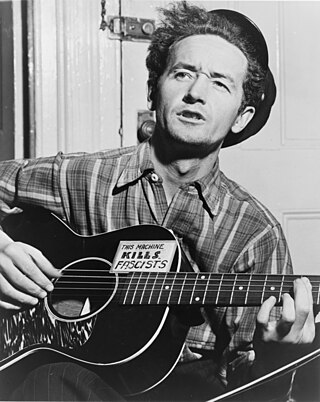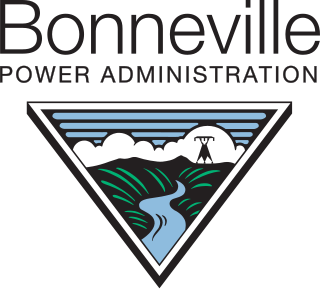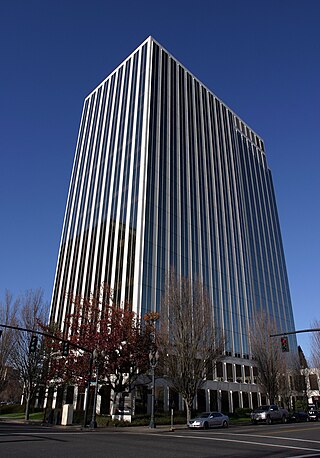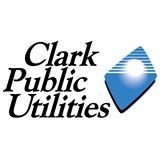
The Columbia River is the largest river in the Pacific Northwest region of North America. The river forms in the Rocky Mountains of British Columbia, Canada. It flows northwest and then south into the U.S. state of Washington, then turns west to form most of the border between Washington and the state of Oregon before emptying into the Pacific Ocean. The river is 1,243 miles long, and its largest tributary is the Snake River. Its drainage basin is roughly the size of France and extends into seven states of the United States and one Canadian province. The fourth-largest river in the United States by volume, the Columbia has the greatest flow of any river entering the Pacific outside of Asia, and the 36th greatest discharge of any river in the world.

Portland General Electric (PGE) is a Fortune 1000 public utility based in Portland, Oregon. It distributes electricity to customers in parts of Multnomah, Clackamas, Marion, Yamhill, Washington, and Polk counties – 44% of the inhabitants of Oregon. Founded in 1888 as the Willamette Falls Electric Company, the company has been an independent company for most of its existence, though was briefly owned by the Houston-based Enron Corporation from 1997 until 2006 when Enron divested itself of PGE during its bankruptcy.

"Roll On, Columbia, Roll On" is an American folk song written in 1941 by American folk singer Woody Guthrie, who popularized the song through his own recording of it. The song glamorized the harnessing of the Columbia River in the Pacific Northwest. The 11 hydroelectric dams built on the American stretch of the Columbia helped farms and industry, but their construction also permanently altered the character of the river.

The Bonneville Power Administration (BPA) is an American federal agency operating in the Pacific Northwest. BPA was created by an act of Congress in 1937 to market electric power from the Bonneville Dam located on the Columbia River and to construct facilities necessary to transmit that power. Congress has since designated Bonneville to be the marketing agent for power from all of the federally owned hydroelectric projects in the Pacific Northwest. Bonneville is one of four regional Federal power marketing agencies within the U.S. Department of Energy (DOE).
A utility cooperative is a type of cooperative that is tasked with the delivery of a public utility such as electricity, water or telecommunications to its members. Profits are either reinvested for infrastructure or distributed to members in the form of "patronage" or "capital credits", which are dividends paid on a member's investment in the cooperative.

Tacoma Power is a public utility providing electrical power to Tacoma, Washington and the surrounding areas. Tacoma Power serves the cities of Tacoma, University Place, Fircrest, and Fife, and also provides service to parts of Steilacoom, Lakewood, and unincorporated Pierce County. It is a division of the Tacoma Public Utilities and owns the Click! Network, developed by Steven Klein, Tacoma Power's former superintendent.

The National Energy Technology Laboratory (NETL) is a U.S. national laboratory under the Department of Energy Office of Fossil Energy. NETL focuses on applied research for the clean production and use of domestic energy resources. It performs research and development on the supply, efficiency, and environmental constraints of producing and using fossil energy resources while maintaining affordability.

A regional transmission organization (RTO) in the United States is an electric power transmission system operator (TSO) that coordinates, controls, and monitors a multi-state electric grid. The transfer of electricity between states is considered interstate commerce, and electric grids spanning multiple states are therefore regulated by the Federal Energy Regulatory Commission (FERC). The voluntary creation of RTOs was initiated by FERC Order No. 2000, issued on December 20, 1999. The purpose of the RTO is to promote economic efficiency, reliability, and non-discriminatory practices while reducing government oversight.

PacifiCorp is an electric power company in the western United States.
Energy Northwest is a public power joint operating agency in the northwest United States, formed 67 years ago in 1957 by Washington state law to produce at-cost power for Northwest utilities. Headquartered in the Tri-Cities at Richland, Washington, the WPPSS became commonly known as "Whoops!", due to over-commitment to nuclear power in the 1970s which brought about financial collapse and the second largest municipal bond default in U.S. history. WPPSS was renamed Energy Northwest in November 1998, and agency membership includes 28 public power utilities, including 23 of the state's 29 public utility districts.
Pacific Northwest Waterways Association, also known as PNWA, is a collaboration of ports, businesses, public agencies and individuals who combine their economic and political strength in support of navigation, trade and economic development throughout the Pacific Northwest.

The Snohomish County Public Utility District is a public utility agency providing power to over 367,000 customers in Snohomish County and on Camano Island, Washington. It provides water service to about 23,000 customers in the northeast section of the Snohomish County.
There is a large array of stakeholders that provide services through electricity generation, transmission, distribution and marketing for industrial, commercial, public and residential customers in the United States. It also includes many public institutions that regulate the sector. In 1996, there were 3,195 electric utilities in the United States, of which fewer than 1,000 were engaged in power generation. This leaves a large number of mostly smaller utilities engaged only in power distribution. There were also 65 power marketers. Of all utilities, 2,020 were publicly owned, 932 were rural electric cooperatives, and 243 were investor-owned utilities. The electricity transmission network is controlled by Independent System Operators or Regional Transmission Organizations, which are not-for-profit organizations that are obliged to provide indiscriminate access to various suppliers to promote competition.

PECI is a private, non-profit American company based in Portland, Oregon with additional offices in Santa Ana, California and San Francisco, California. PECI designs and manages energy efficiency programs for utility providers, government organizations, and other clients. Some of the organizations PECI has worked with include the U.S. Department of Energy, Avista, Wal-mart, Southern California Edison, the Community Energy Project, Energy Trust of Oregon, Pacific Gas & Electric and the San Diego Natural History Museum.

The Northwest Power and Conservation Council is a regional organization that develops and maintains a regional power plan and a fish and wildlife program to balance the Northwest's environment and energy needs. Based in Portland, Oregon, the Council was created in 1980 when the U.S. Congress passed the Pacific Northwest Electric Power Planning and Conservation Act. The council's main task is to develop a 20-year electric power plan that will guarantee adequate and reliable energy at the lowest economic and environmental cost to the Northwest. Member states of the organization are Idaho, Montana, Oregon, and Washington.
Energy Trust of Oregon is an independent nonprofit organization based in Portland, Oregon, United States. Energy Trust offers services, cash incentives, and other stuff to customers of Portland General Electric, Pacific Power, NW Natural, Cascade Natural Gas, and Avista in Oregon and customers of NW Natural in Washington.
The Freshwater Trust is a conservation non-profit based in Portland, Oregon. The mission of The Freshwater Trust is to preserve and restore freshwater ecosystems.

Public Utility District No. 1 of Clark County, doing business as Clark Public Utilities and commonly referred to as Clark PUD, is a public utility district in Clark County, Washington. Clark PUD provides electric service to all of Clark County except for the Georgia-Pacific Camas Paper Mill in the City of Camas, and its water service area covers the majority of the county, except the Cities of Battle Ground, Camas, Ridgefield, Washougal, and Vancouver, which have their own municipal water systems.

Electricity in the Puget Sound region is a significant factor in people's lives, an enabler for the modern economy, and has a unique relationship with the region's environment.

Northwest Open Access Network (NoaNet) is an open-access network in the United States Pacific Northwest region. NoaNet is a public-benefit wholesale telecommunications organization that supplies solutions and resources for all aspects of broadband and telecom projects to serve Washington State including wholesale wide-area and last-mile bandwidth on optic fiber and other means from pooled public utility district (PUD) assets, as well as over 30 colocation centers. It was formed c. 1999 and began operating in 2000 on Bonneville Power Administration-owned fiber. By 2015, it had over 3,000 miles (4,800 km) of fiber.













